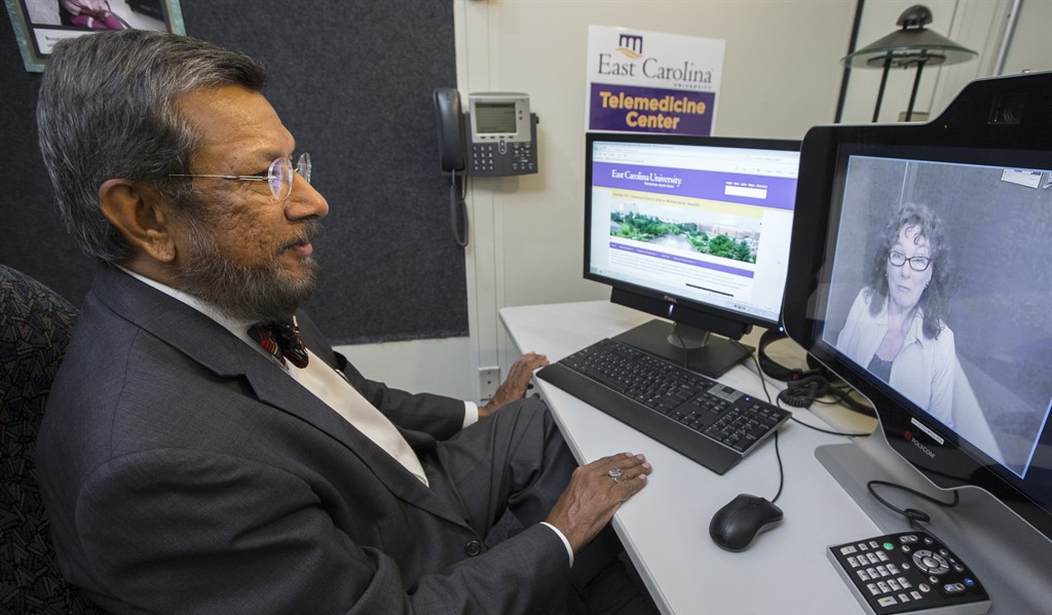The Goldwater Institute is a leading free-market public policy research and litigation organization that is dedicated to empowering all Americans to live freer, happier lives. We accomplish real results for liberty by working in state courts, legislatures, and communities nationwide to advance, defend, and strengthen the freedom guaranteed by the constitutions of the United States and the fifty states.
The following column is by The Goldwater Institute's Senior Policy and Research Analyst, Amanda Hagerman.
Tens of millions of Americans are suffering from a lack of access to healthcare because government regulations are standing in the way. But in one state, vulnerable Americans are getting the help they need thanks to a simple reform that brings medicine into the 21st century.
More than one in five households in Phoenix, Ariz.—including some of the most at-risk patients—have benefitted from a new state law that opens the door for telehealth services, according to a new report from the Goldwater Institute, where I work. That law allows people to access high-quality medical care from the comfort of their own home using a computer, smartphone, or landline phone. Utilizing data from the U.S. Census Bureau’s Household Pulse Survey, Goldwater’s new report shows that lower-income households, the aging population, racial/ethnic minorities, patients with depression, and those who reported difficulty walking were among those who saw some of the greatest benefit.
Telehealth is important because it can remove the geographic, financial, and physical barriers that are associated with in-person care—and during the COVID pandemic, many states were granted telehealth flexibilities. While some states turned those flexibilities into permanent legislation, most let them expire—leaving countless patients without the options they were counting on.
Recommended
Arizona became one of the first states to adopt permanent telehealth legislation, allowing out-of-state medical professionals to provide telehealth services without having to obtain an in-state Arizona license. Now, an Arizonan can make a virtual appointment with a therapist in another state, for example. Letting providers easily practice across states lines has a significant impact on accessibility, appointment wait times, availability of specialty providers, and the diversity of doctors who may be more representative of the populations they serve.
Difficulty walking—a factor closely associated with aging, was the strongest predictor for telehealth utilization in Goldwater’s report. Considering by 2035 there will be more older adults than children in the U.S., expanding telehealth will allow this population to age in place—offering them the independence that comes with seeing a physician from their own home, and at a lower cost to their families and to taxpayers. Expanding telehealth will be particularly important for states with large rural communities, where there are significant provider shortages and higher proportions of seniors.
Depression was also a strong driver of telehealth utilization, with more than half of Phoenix-area telehealth users reporting they had experienced feeling depressed or down, according to Goldwater’s new report. And national analysis of outpatient/office visit claims in 2021 showed that telehealth penetrated the field of psychiatry the most compared to any other healthcare specialties—with as many as 50% of psychiatry visits conducted via telehealth, compared to just 8% of general medicine visits. The need is clear. As millions of Americans face mental health challenges, they should be able to get on the phone and talk to a trusted medical professional, even if their doctor lives in another state.
Despite telehealth's successful track record and its tremendous potential for addressing the national concerns stemming from physician shortages, an aging population, and a raging mental health crisis, most states still won’t open the door to 21st-century healthcare. Just a handful of states have developed ways to remove the 19th-century regulation requiring doctors to be licensed in the state where their patient is located, even if they’re also licensed in another state. Meanwhile, apart from a few exceptions, more than 60% of state medical boards require out-of-state physicians to jump through costly, time-consuming hoops to be approved for an in-state license—a process that takes at least two months, the American Medical Association estimates.
Why should the government prevent patients struggling with depression from talking to a trusted medical professional? Why should the government make it harder for senior citizens who already have a hard time getting around to see their doctor?
It’s individual patients and their doctors, not the government, who know best what kind of care they need, including telehealth. It’s time for the government to step aside.
Amanda Hagerman is the Senior Policy & Research Analyst at the Goldwater Institute, where she evaluates policies related to telehealth, scope of practice reforms for healthcare professions, homelessness, harm reduction, and transparency and accessibility for healthcare, education, and other fields.
























Join the conversation as a VIP Member